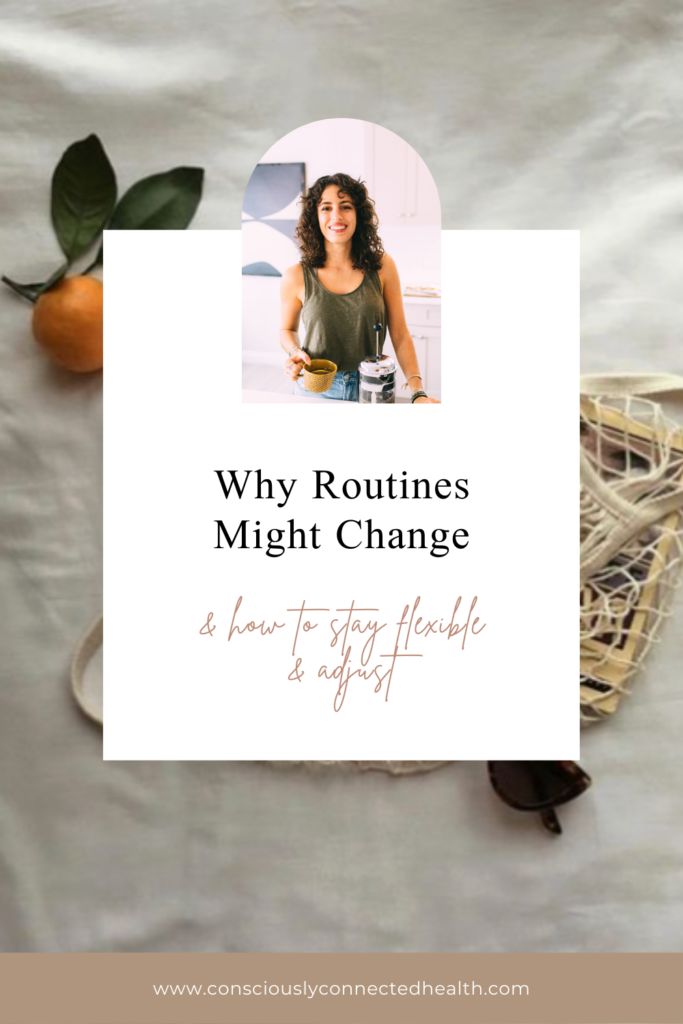Have you ever felt yourself gripping so tightly to a routine, forcing yourself to keep doing it even as it starts to feel like a chore? It’s probably time for a change!
Here’s the gist of what I need you to hear: We are not stagnant beings! And so as we change and evolve, our routines should shift with us.
In this blog, we’ll be exploring:
- Why we might feel pressure to stick to a routine
- Why have routines in the first place and the benefits they can provide
- When and why routines might change
- How to honor changes in routines, stay flexible, and adjust them to meet your current needs

Why we might feel pressure to stick to a routine
Where does this pressure to stick to a routine come from? We often hold ourselves to such high standards and expectations, with a desire for perfectionism and an all-or-nothing mentality. It’s normal to feel this way, and there’s no need to shame or judge yourself for it! You might also feel pressure to stick to a routine because you know the benefits of doing so, and you so badly want to feel your best and be successful.
These days, we are also bombarded with so many external influences from others. We see our favorite wellness gurus telling us what’s important to include in our routines, Instagram influencers showing us glimpses of what they can’t live without, and friends/family telling you all the things they love. It’s easy to perceive everyone else as “the expert” and having all the answers, leaving us feeling pressured to follow their exact routines if we want to “do it right”.
Here’s the thing – there’s no right or wrong, and any action you’re taking to support your well-being is going to be of benefit (one is better than none). So give yourself permission to drop the all-or-nothing mindset which only creates unnecessary stress and an opportunity for disappointment. It’s your life and you’re in control!
I also want to shed light on the fact that you may be giving your power away to other people as you look to them to tell you what you should be doing and what’s best for you. But they’re not YOU! We are each such unique individuals, and it’s so important to find what supports you, your needs, and your vision. It’s great to expand your awareness and pull inspiration from others, but let it be just that: inspiration. Take what serves you, and leave the rest.
Next time you’re feeling pressure, explore where that comes from, what desires or fears are feeding into that pressure, and any unrealistic standards you may be holding yourself to. Acknowledge and get curious without judgment, so you can take action that will support your current needs without distraction from your ego, limiting beliefs, or external sources.
Why have routines in the first place & the benefits they can provide
If you’re wanting to live more intentionally, it’s important to not be operating on autopilot and blindly adopting routines, habits, beliefs, etc. from others. Reconnect with yourself and the bigger picture of why you want a routine in the first place. What’s your motivation? How will it support you and your current needs? Hopefully this awareness will allow you to realize any behavior or mindsets that aren’t serving you, and to take aligned action from a place of grounded clarity.
There are so many beautiful wellness benefits of having routines, including reduced stress and anxiety, higher productivity and better time management, and overall improved health. You really can’t go wrong. But again, connect with why YOU want a routine and how you need it to benefit you. And remember, the energy and intention you bring to your routine matters just as much as what your routine consists of.
When & why routines might change
Ok, now let’s dive into the content you’ve been waiting for! Contrary to what you may think, routines can and should change for quite a few reasons: (this is not an exhaustive list)
- Life changes. Let’s say you create a routine to support your needs and to fit in with your life at a certain point in time. Then a few weeks or four months later your life looks pretty different, yet you’re trying so hard to still make that original routine work under different circumstances. Maybe your schedule changes, your priorities or responsibilities shift, or you move to a new place. Not only are these all things you have to adjust to mentally and physically, but what you’re needing to support your wellbeing is likely going to shift as well.
- Personal desires. Are you simply wanting something different? That’s reason enough! You’re in control of your life and you’re responsible for all your choices. Give yourself the freedom and authority to shift simply because you want to.
- Seasonal changes. Varying hours of daylight, weather, temperature and changing seasonal foods can all impact your routines. Your morning routine in winter might involve exercise indoors, journaling in bed, and a warm superfood late, as opposed to a summer routine of outdoor physical activities, journaling on the back patio, and a green juice or smoothie. Seasonal changes influence our entire being, not just our physical bodies, and so shifting your activities to support feeling more grounded vs. more energetic, or more reflective vs. action oriented is equally important.
- Menstrual cycle. As women, we go through four phases in our menstrual cycle which are characterized by differing hormone levels and subsequent shifts in our overall bodies (not just physically). For example, in the ovulatory phase when estrogen peaks and energy is high, you might have routines with more intense exercise, room for play, and connecting with others. In the late luteal and menstrual phase when hormones and energy are low, you might focus on more restful, reflective and interoceptive activities.
How to honor changes in routines, stay flexible, & adjust them to meet your current needs
Remember that your routine should support your current needs, and that you’re not a stagnant human being, but rather always growing and evolving. It’s about you, and as your needs shift, your routines should shift with them. The prerequisite to this is being in tune and connected enough with yourself to be able to discern what you’re needing at any given time. Which brings us back to routines, because they are the perfect opportunity to prioritize and consistently take the time for self-connection! It comes full circle.
And honestly, if change and being flexible is a stressor for you, that should be a sign that you’re needing support in these areas. Again, routines are the perfect resource for this as they create structure and stability, and you can include activities to help manage stress and stay grounded. Think meditation, journaling, conscious breathing, yoga, mindful stretching and walking, etc.
It’s also important to check in on your mindset around routines. Choosing to look at them as a way to love and care for yourself facilitates a higher vibrational state, and can make compassion, dedication, and flexibility that much easier. Release the all-or-nothing mindset, and expect that it might take trial and error to find what really works for you (which will change over time). When you accept and view routines as a tool to embody your personal vision of health and how you want to show up in the world, why wouldn’t you welcome change if it means more opportunity for your personal evolution?
If you’re needing more detailed resources on how to adjust a current routine or create a new one, you can find all that good information HERE.
I hope all this helps you release some rigidity around routines, and invite a playful flexibility from a place of curiosity and self-love. You are in control of your life – everything from the thoughts you think, the words you speak, and the actions you take can support your embodiment of your highest self if you choose so. I hope you find that empowering and motivating!
And just to remind you – you don’t have to always have a routine for everything. If you need complete freedom and space to just be, then choose to explore and honor that for a bit. Create such a strong relationship with yourself, that it becomes second nature and easy to truly know what you’re needing and when.
To explore more on the topic of routines, check out these blog posts:
- Wellness Benefits of Having Routines
- How to Create a Strong Foundation and Framework for Any Routine
- Inspiration for Creating Your Own Routines
- Finding Harmony Between Commitment and Flexibility in Your Routines


Be the first to comment